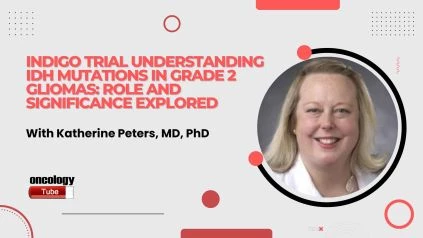Dr. Katherine Peters from Duke University Medical Center discussed the current treatments and their limitations for low-grade glioma patients with isocitrate dehydrogenase (IDH) mutations.
These treatments include surgery, chemotherapy, and radiation therapy, but they can cause neurologic injury, bone marrow suppression, toxicities, fertility issues, and cognitive dysfunction, leading to a decline in quality of life.
IDH1 and IDH2 mutations were discovered in 2009 and were found to confer a prognostic advantage and drive the development of gliomas.
The latest World Health Organization (WHO) guidelines in 2021 incorporated these mutations into the integrated diagnosis for patients, considering their impact on outcomes and chemo sensitivity.
Vorasidenib (VOR) is a dual inhibitor of mutant IDH1/2 enzymes and differs from other treatment approaches for grade 2 gliomas by specifically targeting the tumor.
Unlike previous treatments that were adapted from high-grade glioma treatments, Vorasidenib is a rational and tumor-specific treatment.
The INDIGO study was a randomized, placebo-controlled trial that evaluated Vorasidenib in patients with newly diagnosed grade 2 tumors harboring IDH1 or IDH2 mutations.
The primary endpoint was progression-free survival assessed through MRI imaging, while the key secondary endpoint was the time to the next intervention.
The study included young adult patients who had undergone surgery, were between 1 and 5 years from the last surgery, and had measurable disease.
The findings of the study demonstrated a significant improvement in radiographic progression-free survival in patients receiving Vorasidenib compared to the placebo group.
The median progression-free survival was 27.7 months for Vorasidenib compared to 11.1 months for the placebo.
The time to the next intervention has not been reached in the Vorasidenib group, indicating a prolonged treatment benefit.
In contrast, the placebo group had a median time to next intervention of 17.8 months.
The most commonly observed adverse event in the Vorasidenib group was an elevation of liver function tests, which were reversible upon discontinuation of the drug.
Overall, Vorasidenib was well-tolerated, with no notable neurologic or bone marrow toxicity.
The study’s findings have significant implications for clinical benefit and the potential impact on the treatment landscape for grade 2 mutant IDH glioma.
Vorasidenib could potentially change the standard of care for patients with IDH mutations, reducing the need for additional surgeries, radiation, and chemotherapy.
Future research directions include exploring combinations of Vorasidenib with immunotherapy, such as Pembrolizumab, and investigating the use of targeted therapies in grade 3 and grade 4 gliomas.
In conclusion, the INDIGO trial demonstrated that Vorasidenib, as a targeted therapy for IDH mutant tumors, is well-tolerated and significantly improves progression-free survival and delays the need for further interventions.
These findings have the potential to revolutionize the treatment of grade 2 gliomas and may pave the way for future advancements in targeted therapies for other glioma grades.

